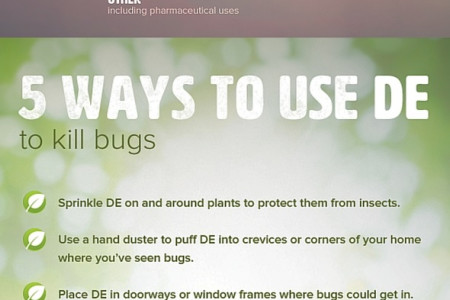
DIY Organic Garden Pest Control
DIY PEST CONTROL for the Savvy Gardener! i Using organic pest control methods in your garden is important for maintaining a healthy environment for your plants. See how you can stop pests from damaging your precious garden or crop and keep it looking beautiful without using chemicals. WANTED Aphid Japanese Beetle Squash Beetle Grasshopper Cabbage Worm Other criminals: Earwigs, Mealybugs, Birch Leaf Miners, Gypsy Moths, Spider Mites CRIMES COMMITTED I Destroy your garden by taking up residence and eating your plants Lay eggs that turn into many hungry larvae that eat more than the adults Create inhospitable environment for your garden through other problems POWERFUL ALLIES Not all bugs are created equal and not all are bad either. There are plenty of "good" i insects that help control the "bad" insects and keep your garden safe and secure. Having these beneficial insects in your garden provides natural pest control. Lady Beetle Lacewing Praying Mantis Ground Beetle Spiders Additional allies: Rove beetles, Hover flies, Dragonflies, Predatory Mites, Parasitic Wasps HOW THEY DEFEND YOUR GARDEN Hunt and feed on "bad" insects that destroy your garden and crop Take up residence in your garden or crop to provide ongoing security V Do not damage your garden, since they are predators that hunt other insects WHERE TO FIND THEM BUGS INSIDE Order them. Attract them with insectary plants. INSECTARY PLANTS Using insectary plants lures beneficial insects into your garden, which help control bad insects. Designating at least 5-10% of your garden for insectary plants will help attract these beneficial insects and keep the bad insect population down. Cornflower Alyssum Fennel Borage Anise Other plants: Marigolds, Sunflowers, Cup Plants, Golden Marguerite, Zinnias, Cosmos HOW THEY HELP YOUR GARDEN O Provide rich nectar that attracts beneficial insects to your garden Provide shelter, food and a safe environment for beneficial insects to thrive Reduces the need for insecticides and dangerous chemicals in your garden HOW TO DO IT 5-10% How much of your garden to designate to insectary plants. Plant year-round blooms to keep beneficial insects from leaving. ROW COVERS Using row covers in your garden has many benefits including providing protection from malicious pests as well as shelter from harsh weather conditions. Row covers come in several materials and thicknesses depending on the goals you have. ROW COVER BENEFITS Excellent barrier against insects that seek to damage your garden Allow air, water & light to pass through, providing nourishment & protection * Heavy covers provide frost protection during cold winter months HOW TO INSTALL THEM 1 Insert metal hoops into soil approximately 2 feet apart. Use at least a medium weight cover to lay over the hoops. Anchor the cover using rocks, soil or other heavy objects. DIATOMACEOUS EARTH (FOOD GRADE) i Diatomaceous Earth (D.E.) is a fine powder that is made up of fossilized algae. While, D.E. feels soft in the hand, under a microscope it has razor sharp edges, which pierce the exoskeletons of pests, soon causing dehydration & death. D.E. POWDER DIATOMACEOUS EARTH BENEFITS All natural compound made of fossilized algae that is completelý safe Kills pests physically thus preventing chemical resistances from forming Safe for your garden, but dangerous to plant destroying insects HOW TO APPLY IT Apply to leaves with a duster, while wearing a dust mask. Re-apply after rainfall to maintain effectiveness. REFERENCES http://www.finegardening.com/attracting-beneficial-insects http://www.organicgardening.com/learn-and-grow/row-covers http://www.organicgardening.com/learn-and-grow/flowers-borders http://www.mnn.com/your-home/organio-farming-gardening/stories/good-bug-bad-bug-how-can-you-tell-the-difference http://www.mama-knows.com/gardening-tips/top-10-bad-insects-for-your-garden.html http://permaculturenews.org/2014/10/04/plants-attract-beneficial-insects/ http://cru.cahe.wsu.edu/CEPublications/FS089E/FS089E.pdf http://www.gardeningknowhow.com/plant-problems/pests/pesticides/diatomaceous-earth-insect-control.htm http://www.motherearthnews.com/organic-gardening/plants-to-attract-beneficial-insects-zl0z1005zvau.aspx http://www.extension.org/pages/18573/farmscaping:-making-use-of-natures-pest-management-services http://en.wikipedia.org/wiki/lnsectary_plant http://www.ecolandscaping.org/09/native-plants/farmscaping-with-native-plants/ http://www.sare.org/Learning-Center/Conference-Materi- als/The-New-American-Farm-Conference/Breakout-Sessions/Farmscaping-to-Manage-Insects http://en.wikipedia.org/wiki/Insectary_plant http://en.wikipedia.org/wiki/Diatomaceous_earth http://www.motherearthnews.com/organic-gardening/guide-to-organio-pest-control-zmaz08aszgoe.aspx http://web.extension.illinois.edu/codms/yg/120811.html http://web.extension.illinois.edu/cfiv/homeowners/990220.html Icons made by Freepik (http://www.flaticon.com/authors/freepik) Licensed by C BY 3.0 (http://creativecommons.org/licenses/by/3.0) INFOGRAPHIC BY ORGANICPESTCONTROLNYC.COM 個
DIY Organic Garden Pest Control
Designer
Mike BondsSource
http://organ...fographic/Category
How ToGet a Quote











